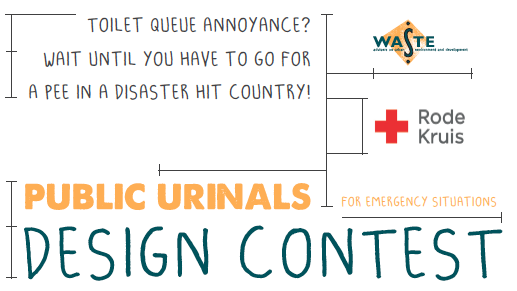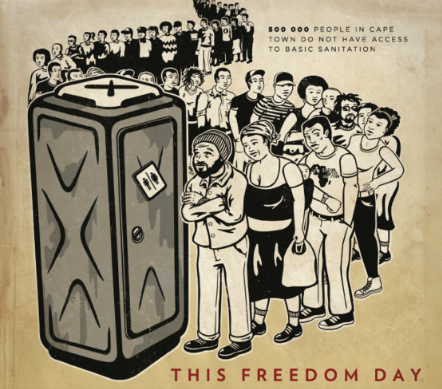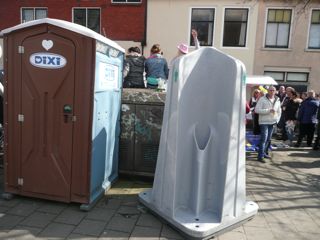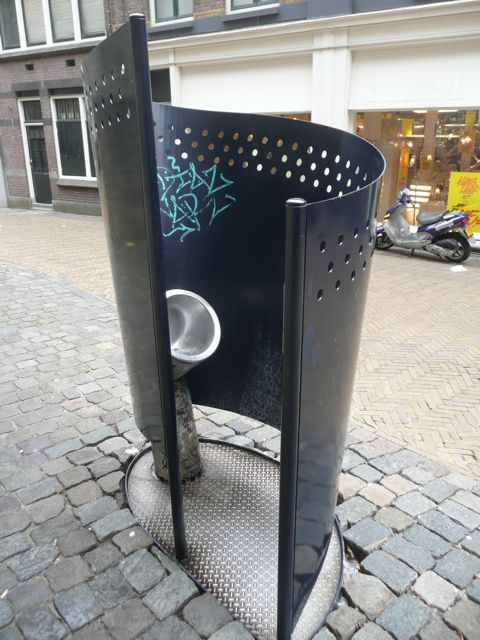Our design contest resulted in 14 applications from 11 different countries:

Experts in the field of emergency sanitation scored the applications. We now call upon the general public to vote for their favorite among 4 nominated entries. The voting closes Sunday 17 November at 12 pm GMT.
You can vote at: http://waste.nl/en/design-contest

FOR MORE INFORMATION
You can contact the focal point for the Emergency Sanitation at WASTE through: emergencysanitation@waste.nl
A NEW DESIGN FOR AN OLD PROBLEM
The ESP Design Contest on Public Urinal Systems for Emergency Situations aims to source new designs for the safe and convenient disposal of human urine. It is hoped that the contest will provide the humanitarian sector with new ideas and ways of working in order to tackle a critical problem. We also hope to influence the next generation of product designers, engineers and producers to focus on the critical challenge of sanitation, both in emergency response and long-term development.

URINATION AND LONG TOILET QUEUES
Lack of access to sanitation in emergency often leads to indiscriminate urination, especially if there are long toilet queues. Moreover, the limited number of toilets present is used inefficiently: people who urinate occupy the space of people who want to defecate. The introduction of ‘public’ urinals is expected to boost the efficiency of the existing toilets: the use of sanitation facilities will increase, the waiting time for toilets will decrease and the lifetime of dug pits and raised latrines will increase. These urinals should be attractive and safe to use, lightweight to transport by air to emergency situations and easy to install. The urinals need to be equipped with a urine management facility: a storage container that can be emptied or, in the worst case a soak pit for disposal. As a guide, a urinal that serves 50 people and is emptied on a two weekly basis, with each person producing 1? per person per day, will need a the tank of around 1m3.
WE ARE LOOKING FOR:
- A versatile kit for a urinal, consisting of a urinal and urine management system (container for collecting the urine, which allows emptying and treatment elsewhere or a soakpit).
- A solution that could be a block of urinals, an individual urinal or, ideally, be configurable to both situations.
- Size and shape: we are looking for a urinal that is suitable for:
- Children
- Adult men
- Adult women
- Less abled
- On arrival in a disaster-hit country, it is unlikely that there are forklift trucks, so the solution should be able to be manhandled.
- A solution that is suitable for airfreight, so packing as small and light as possible are key. Ideally, the solution will fit on a EUR-pallet. As a guide, airfreight can cost € 1-8 per kilogram or € 0.3-1.5 per litre.
- A solution that could be quick and easy to assemble, requiring little or no skill.
- A solution that could be a complete kit, not requiring any materials to be sourced in country.

EVALUATION CRITERIA OF THE AWARD
Entries will be scored on seven criteria:
- Feasibility in emergency
- Speed of installation
- Capital cost
- Operation and maintenance requirements and cost
- Originality
- Cost of transport
- Opinion of the users (reliefagencies)
Tips on a successful entry
- The more likely the design can be carried out to production the higher it will score. Relying on expensive or unproven technology will result in an unsuccessful entry.
- Have a well-defined, easy-to-understand design that the judges can grasp easily. Include clear schematics and descriptions of installation, operation, and maintenance processes. A prototype at scale would be ideal.
- Focus on increase of urinal use in emergency situations rather than potential side benefits such as use of urine for agriculture or the harvesting of urea.
THE AWARD
- Twelve project will be selected for final review: 3 for children, 3 for adult men, 3 for adult women and 3 for less abled.
- The finalist will present their design concept to the judging panel on world toilet day 2013, 19th November 2013.
- The emergency sanitation project will approach producers to produce the designs of the overall top finalist.
- The overall top finalist will receive a field visit of a week including travel and lodging to the country where the produced design will be field-tested or € 1000 cash.
HOW TO APPLY
- The application form is available online at and by request to emergencysanitaton@waste.nl.
- All relevant information must be included in the application form.
- Cover letters, etc., are not required.
- The project proposal must be related to the problem statement.
- A completed application should be completed in English, signed, scanned into PDF Format and sent attached to an e-mail to emergencysanitation@waste.nl with the subject line: URINAL DESIGN CONTEST APPLICATION.
DEADLINE
Application forms must be received by 12:00 pm GMT Friday, 18 October 2013.
 |
TERMS AND CONDITIONS
When entering the design contest, entrants agree to the following terms and conditions:
- An entrant may submit more than one entry but is only eligible for one award. A separate application form is required for each submission.
- All personal data provided to the WASTE is kept confidential.
- Entrant agrees that all submitted designs will remain free of patent or copyright.
- WASTE is entitled to publish or use the designs freely, but has no obligation to do so.
- Neither the entrant nor WASTE will assume any liability for any use of submitted designs.
- There is no entry fee for entering the ESP design contest. Participants are therefore responsible for any expenses made in order to submit their application(s).
- All entries must be submitted by email using the application form. Entries not meeting the submission requirements may not be judged.
- Entries must not exceed 15 pages in length or 15 MB in file size.
- The contestant must be at least eighteen (18) years of age on the date he/she enters the contest.
- Immediate family members (siblings, children and grandchildren) of members of the judging panel for the Emergency Sanitation Project Design Contest are not eligible to enter the contest.
- Submissions must be original and unpublished work by the contestant and not infringe on any copyright or patent laws.
- The contest will end on 18 October 2013 at 12:00 p.m. (GMT). Entries submitted after this time or modified past the end of the contest will not be eligible.
- The top ten finalists will be announced by World Toilet Day, November 19th, 2013. Each finalist will be asked to present their design to the judging panel by phone or video conference.
- Submissions will be judged by a judging panel determined by WASTE. Decisions of the judging panel are final and without appeal. The judging panel verifies that the design meets the stated criteria “Evaluation Criteria of the Award” (above)
- The emergency sanitation project will approach producers to produce the designs of the top finalist. The top finalist will receive a field visit of a week including travel and lodging to the country where the produced design will be field-tested.
- By submitting the application form, entrants agree to release and hold harmless WASTE from and against any and all claims, expenses and liability including, but not limited to, negligence and damages of any kind to persons and property, infringement of patent or, copyright arising out of, or relating to, participation in the contest.
- Nothing herein shall constitute or be considered to be a limitation or a waiver of the privileges and immunities of the WASTE, which are specifically reserved.
- These terms and conditions are subject to change.
MORE INFORMATION?
If you have any questions please get in touch with:
Jan Spit, Adviser Sanitation
WASTE advisers on urban environment and development
www.waste.nl
e-mail: jspit@waste.nl
mob: +31 6 57 99 78 74